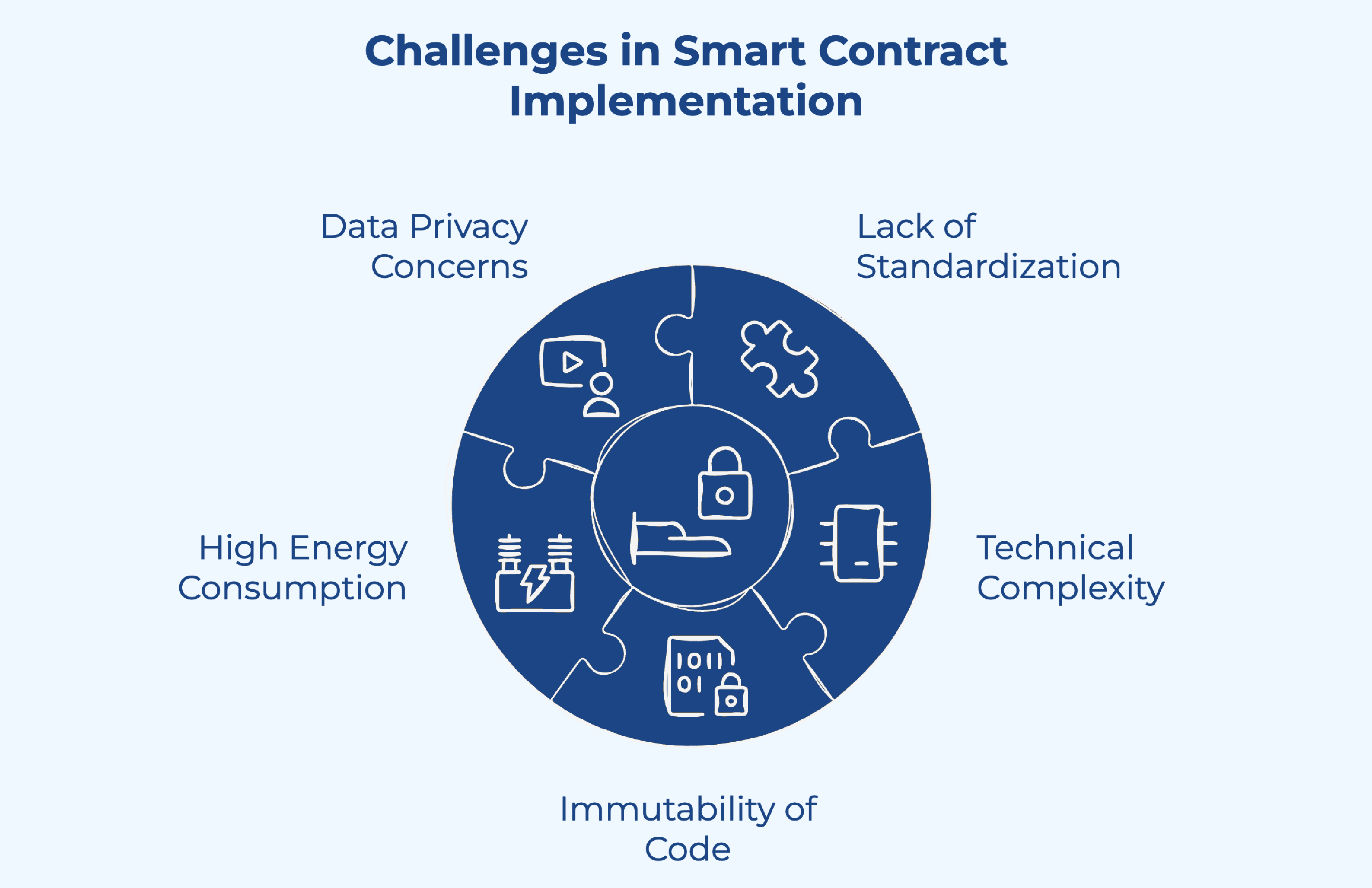How to overcome the challenges of smart contract implementation
Dec 24, 2024



As DeFi and Web3 solutions gain traction globally, businesses increasingly use decentralized approaches to secure transactions. Central to this transformation are smart contracts—automated, blockchain-based agreements programmed with specific terms. Their appeal is evident, with the global smart contract market projected to grow from $190 million in 2022 to an impressive $1.08 billion by 2030. For businesses that have yet to implement smart contracts, now is an opportune moment to embrace this technology.
However, the adventure to smart contract implementation additionally involves several demanding situations. This blog explores businesses' challenges in implementing smart contracts and shares actionable solutions.
A Quick Overview of Smart Contracts
Smart contracts are self-executing contracts with particular phrases encoded into the software program. These virtual contracts automatically put into effect and execute the terms when predefined situations are met.
Why Should Businesses Prefer Smart Contract Implementation?
Businesses ought to decide upon smart contract implementation because of the following advantages:
Automation: Smart contracts automate the contract execution when predefined situations are met. Hence, it eliminates the manual intervention.
Cost-Effective: Implementing smart contracts reduces reliance on intermediaries, cutting transaction and operational prices.
Security: Smart contracts are powered via the blockchain era, which ensures tamper evidence and transparent facts.
Trustless Transactions: Smart contract implementation permits direct interactions between events without the need for mutual consideration or intermediaries.
Transparency: Smart contract solutions provide complete visibility of phrases and moves that foster acceptance as accurate with and duty.
Immutability: Smart contracts become immutable once deployed, guaranteeing consistency and reliability in all transactions.
Key Challenges in Smart Contract Implementation

Lack of Standardization
Different blockchains utilize varying protocols and programming languages, which makes interoperability a sizeable mission. There is a desire for universally widespread smart contract standards, as their absence creates confusion amongst groups about whether these digital contracts can work seamlessly across multiple platforms.
Technical Complexity
Smart contract development and deployment additionally require specialized capabilities. The man or woman needs information in blockchain technology, cryptography, and coding languages like Solidity. Several companies lack in-house skills and want to outsource the professionals, which makes the smart contract implementation method costly and time-consuming.
Immutability of Code
While immutability is blockchain electricity, it also poses demanding situations for smart contracts. Once deployed, competent contract answers can not be altered or modified without difficulty, although they incorporate mistakes or need updates. Errors inside the code can cause widespread economic losses or stalled operations.
High Energy Consumption
Some blockchain systems use electricity-intensive consensus mechanisms like Proof of Work (PoW). Implementing smart contracts on such structures can increase operational costs, improve environmental concerns, and affect consumer experience. Businesses, mainly startups with low budgets, may additionally hesitate to invest in smart contract development due to sustainability troubles.
Data Privacy Concerns
Smart contracts regularly require sensitive facts to operate efficiently. Blockchain's transparency can war with privacy guidelines. Businesses can also face the risk of non-compliance and capability legal penalties.
Overcoming Challenges in Smart Contract Implementation
Adopting Interoperable Standards
Standardization is vital for the tremendous adoption of smart contracts. Using interoperable blockchain protocols like Polkadot or Cosmos can facilitate a move-chain communique. For instance, businesses can install smart contracts on platforms that help standardized APIs obtain compatibility.
Investing in Talent and Training
Successful smart contract implementation is possible when a man or woman has technical knowledge in this discipline. It might be ideal for providing schooling for existing personnel or renting skilled blockchain builders from a smart contract improvement business enterprise. Businesses can lease academic establishments for blockchain certification applications.
Clarifying Legal Frameworks
Governments and regulatory bodies must address the prison ambiguities surrounding smart contracts. Advocate for clean regulations that define the enforceability and obstacles of smart contracts. Several countries globally have begun smart contract implementation into their criminal systems, providing a model for others to observe.
Incorporating Upgradability Features
The immutability feature of smart contracts restricts the person from making the changes essential for its safety. There must be flexibility in smart contracts as it can help mitigate the risks related to immutability. Implement proxy contracts or modular designs that permit upgrades without redeploying the complete contract.
Conducting Rigorous Security Audits
Ensuring the safety of smart contracts is non-negotiable. It is vital to complete smart contract audits and penetration testing before deployment. Avail auditing offerings from a reputed smart contract development and auditing organization as they have experienced auditors who can effortlessly perceive and attach vulnerabilities.
Transitioning to Energy-Efficient Blockchains
Choosing the right blockchain platform through smart contract implementation is vital to dealing with sustainability issues. Opt for systems using Proof of Stake (PoS) or other green consensus mechanisms. For instance, Ethereum's transition to PoS considerably helped it reduce its strength consumption to a notable volume and make the blockchain more appealing to agencies.
Enhancing Privacy Measures
Businesses need to stabilize transparency with privacy compliance. Use privacy-maintaining technologies like zero-know-how proofs (ZKPs) or personal blockchains. Solutions like zk-SNARKs keep sensitive facts hidden while ensuring contractual terms are met.
Best Practices for Smart Contract Implementation
Start Small: Start with pilot tasks to check the feasibility and resolve preliminary challenges.
Collaborate with Experts: Partner with a brilliant contract development company to streamline the technique.
Incorporate Fail-Safes: Design a smart contract with this mechanism to halt execution when unexpected problems arise.
Focus on User Education: All stakeholders should understand the functionality and obstacles to smart contracts.
Monitor and Update: Regularly evaluate the performance of deployed contracts and adapt to rising technologies and traits in the web3 area.
Conclusion
Smart contracts hold the capacity to transform business operations via automation. However, smart contract implementation has challenges that should be addressed through excellent practices, progressive, competent contract answers, and collaboration with a reputable, skilled organization for comprehensive help. If you are searching for a satisfactory, smart contract development company to guide you from development to deployment, decentrablock is the companion you may trust. At decentblock, we possess technical prowess in blockchain technology and its prison framework, making us a super accomplice to help form the future of your business while ensuring stable virtual transactions.
As DeFi and Web3 solutions gain traction globally, businesses increasingly use decentralized approaches to secure transactions. Central to this transformation are smart contracts—automated, blockchain-based agreements programmed with specific terms. Their appeal is evident, with the global smart contract market projected to grow from $190 million in 2022 to an impressive $1.08 billion by 2030. For businesses that have yet to implement smart contracts, now is an opportune moment to embrace this technology.
However, the adventure to smart contract implementation additionally involves several demanding situations. This blog explores businesses' challenges in implementing smart contracts and shares actionable solutions.
A Quick Overview of Smart Contracts
Smart contracts are self-executing contracts with particular phrases encoded into the software program. These virtual contracts automatically put into effect and execute the terms when predefined situations are met.
Why Should Businesses Prefer Smart Contract Implementation?
Businesses ought to decide upon smart contract implementation because of the following advantages:
Automation: Smart contracts automate the contract execution when predefined situations are met. Hence, it eliminates the manual intervention.
Cost-Effective: Implementing smart contracts reduces reliance on intermediaries, cutting transaction and operational prices.
Security: Smart contracts are powered via the blockchain era, which ensures tamper evidence and transparent facts.
Trustless Transactions: Smart contract implementation permits direct interactions between events without the need for mutual consideration or intermediaries.
Transparency: Smart contract solutions provide complete visibility of phrases and moves that foster acceptance as accurate with and duty.
Immutability: Smart contracts become immutable once deployed, guaranteeing consistency and reliability in all transactions.
Key Challenges in Smart Contract Implementation

Lack of Standardization
Different blockchains utilize varying protocols and programming languages, which makes interoperability a sizeable mission. There is a desire for universally widespread smart contract standards, as their absence creates confusion amongst groups about whether these digital contracts can work seamlessly across multiple platforms.
Technical Complexity
Smart contract development and deployment additionally require specialized capabilities. The man or woman needs information in blockchain technology, cryptography, and coding languages like Solidity. Several companies lack in-house skills and want to outsource the professionals, which makes the smart contract implementation method costly and time-consuming.
Immutability of Code
While immutability is blockchain electricity, it also poses demanding situations for smart contracts. Once deployed, competent contract answers can not be altered or modified without difficulty, although they incorporate mistakes or need updates. Errors inside the code can cause widespread economic losses or stalled operations.
High Energy Consumption
Some blockchain systems use electricity-intensive consensus mechanisms like Proof of Work (PoW). Implementing smart contracts on such structures can increase operational costs, improve environmental concerns, and affect consumer experience. Businesses, mainly startups with low budgets, may additionally hesitate to invest in smart contract development due to sustainability troubles.
Data Privacy Concerns
Smart contracts regularly require sensitive facts to operate efficiently. Blockchain's transparency can war with privacy guidelines. Businesses can also face the risk of non-compliance and capability legal penalties.
Overcoming Challenges in Smart Contract Implementation
Adopting Interoperable Standards
Standardization is vital for the tremendous adoption of smart contracts. Using interoperable blockchain protocols like Polkadot or Cosmos can facilitate a move-chain communique. For instance, businesses can install smart contracts on platforms that help standardized APIs obtain compatibility.
Investing in Talent and Training
Successful smart contract implementation is possible when a man or woman has technical knowledge in this discipline. It might be ideal for providing schooling for existing personnel or renting skilled blockchain builders from a smart contract improvement business enterprise. Businesses can lease academic establishments for blockchain certification applications.
Clarifying Legal Frameworks
Governments and regulatory bodies must address the prison ambiguities surrounding smart contracts. Advocate for clean regulations that define the enforceability and obstacles of smart contracts. Several countries globally have begun smart contract implementation into their criminal systems, providing a model for others to observe.
Incorporating Upgradability Features
The immutability feature of smart contracts restricts the person from making the changes essential for its safety. There must be flexibility in smart contracts as it can help mitigate the risks related to immutability. Implement proxy contracts or modular designs that permit upgrades without redeploying the complete contract.
Conducting Rigorous Security Audits
Ensuring the safety of smart contracts is non-negotiable. It is vital to complete smart contract audits and penetration testing before deployment. Avail auditing offerings from a reputed smart contract development and auditing organization as they have experienced auditors who can effortlessly perceive and attach vulnerabilities.
Transitioning to Energy-Efficient Blockchains
Choosing the right blockchain platform through smart contract implementation is vital to dealing with sustainability issues. Opt for systems using Proof of Stake (PoS) or other green consensus mechanisms. For instance, Ethereum's transition to PoS considerably helped it reduce its strength consumption to a notable volume and make the blockchain more appealing to agencies.
Enhancing Privacy Measures
Businesses need to stabilize transparency with privacy compliance. Use privacy-maintaining technologies like zero-know-how proofs (ZKPs) or personal blockchains. Solutions like zk-SNARKs keep sensitive facts hidden while ensuring contractual terms are met.
Best Practices for Smart Contract Implementation
Start Small: Start with pilot tasks to check the feasibility and resolve preliminary challenges.
Collaborate with Experts: Partner with a brilliant contract development company to streamline the technique.
Incorporate Fail-Safes: Design a smart contract with this mechanism to halt execution when unexpected problems arise.
Focus on User Education: All stakeholders should understand the functionality and obstacles to smart contracts.
Monitor and Update: Regularly evaluate the performance of deployed contracts and adapt to rising technologies and traits in the web3 area.
Conclusion
Smart contracts hold the capacity to transform business operations via automation. However, smart contract implementation has challenges that should be addressed through excellent practices, progressive, competent contract answers, and collaboration with a reputable, skilled organization for comprehensive help. If you are searching for a satisfactory, smart contract development company to guide you from development to deployment, decentrablock is the companion you may trust. At decentblock, we possess technical prowess in blockchain technology and its prison framework, making us a super accomplice to help form the future of your business while ensuring stable virtual transactions.
As DeFi and Web3 solutions gain traction globally, businesses increasingly use decentralized approaches to secure transactions. Central to this transformation are smart contracts—automated, blockchain-based agreements programmed with specific terms. Their appeal is evident, with the global smart contract market projected to grow from $190 million in 2022 to an impressive $1.08 billion by 2030. For businesses that have yet to implement smart contracts, now is an opportune moment to embrace this technology.
However, the adventure to smart contract implementation additionally involves several demanding situations. This blog explores businesses' challenges in implementing smart contracts and shares actionable solutions.
A Quick Overview of Smart Contracts
Smart contracts are self-executing contracts with particular phrases encoded into the software program. These virtual contracts automatically put into effect and execute the terms when predefined situations are met.
Why Should Businesses Prefer Smart Contract Implementation?
Businesses ought to decide upon smart contract implementation because of the following advantages:
Automation: Smart contracts automate the contract execution when predefined situations are met. Hence, it eliminates the manual intervention.
Cost-Effective: Implementing smart contracts reduces reliance on intermediaries, cutting transaction and operational prices.
Security: Smart contracts are powered via the blockchain era, which ensures tamper evidence and transparent facts.
Trustless Transactions: Smart contract implementation permits direct interactions between events without the need for mutual consideration or intermediaries.
Transparency: Smart contract solutions provide complete visibility of phrases and moves that foster acceptance as accurate with and duty.
Immutability: Smart contracts become immutable once deployed, guaranteeing consistency and reliability in all transactions.
Key Challenges in Smart Contract Implementation

Lack of Standardization
Different blockchains utilize varying protocols and programming languages, which makes interoperability a sizeable mission. There is a desire for universally widespread smart contract standards, as their absence creates confusion amongst groups about whether these digital contracts can work seamlessly across multiple platforms.
Technical Complexity
Smart contract development and deployment additionally require specialized capabilities. The man or woman needs information in blockchain technology, cryptography, and coding languages like Solidity. Several companies lack in-house skills and want to outsource the professionals, which makes the smart contract implementation method costly and time-consuming.
Immutability of Code
While immutability is blockchain electricity, it also poses demanding situations for smart contracts. Once deployed, competent contract answers can not be altered or modified without difficulty, although they incorporate mistakes or need updates. Errors inside the code can cause widespread economic losses or stalled operations.
High Energy Consumption
Some blockchain systems use electricity-intensive consensus mechanisms like Proof of Work (PoW). Implementing smart contracts on such structures can increase operational costs, improve environmental concerns, and affect consumer experience. Businesses, mainly startups with low budgets, may additionally hesitate to invest in smart contract development due to sustainability troubles.
Data Privacy Concerns
Smart contracts regularly require sensitive facts to operate efficiently. Blockchain's transparency can war with privacy guidelines. Businesses can also face the risk of non-compliance and capability legal penalties.
Overcoming Challenges in Smart Contract Implementation
Adopting Interoperable Standards
Standardization is vital for the tremendous adoption of smart contracts. Using interoperable blockchain protocols like Polkadot or Cosmos can facilitate a move-chain communique. For instance, businesses can install smart contracts on platforms that help standardized APIs obtain compatibility.
Investing in Talent and Training
Successful smart contract implementation is possible when a man or woman has technical knowledge in this discipline. It might be ideal for providing schooling for existing personnel or renting skilled blockchain builders from a smart contract improvement business enterprise. Businesses can lease academic establishments for blockchain certification applications.
Clarifying Legal Frameworks
Governments and regulatory bodies must address the prison ambiguities surrounding smart contracts. Advocate for clean regulations that define the enforceability and obstacles of smart contracts. Several countries globally have begun smart contract implementation into their criminal systems, providing a model for others to observe.
Incorporating Upgradability Features
The immutability feature of smart contracts restricts the person from making the changes essential for its safety. There must be flexibility in smart contracts as it can help mitigate the risks related to immutability. Implement proxy contracts or modular designs that permit upgrades without redeploying the complete contract.
Conducting Rigorous Security Audits
Ensuring the safety of smart contracts is non-negotiable. It is vital to complete smart contract audits and penetration testing before deployment. Avail auditing offerings from a reputed smart contract development and auditing organization as they have experienced auditors who can effortlessly perceive and attach vulnerabilities.
Transitioning to Energy-Efficient Blockchains
Choosing the right blockchain platform through smart contract implementation is vital to dealing with sustainability issues. Opt for systems using Proof of Stake (PoS) or other green consensus mechanisms. For instance, Ethereum's transition to PoS considerably helped it reduce its strength consumption to a notable volume and make the blockchain more appealing to agencies.
Enhancing Privacy Measures
Businesses need to stabilize transparency with privacy compliance. Use privacy-maintaining technologies like zero-know-how proofs (ZKPs) or personal blockchains. Solutions like zk-SNARKs keep sensitive facts hidden while ensuring contractual terms are met.
Best Practices for Smart Contract Implementation
Start Small: Start with pilot tasks to check the feasibility and resolve preliminary challenges.
Collaborate with Experts: Partner with a brilliant contract development company to streamline the technique.
Incorporate Fail-Safes: Design a smart contract with this mechanism to halt execution when unexpected problems arise.
Focus on User Education: All stakeholders should understand the functionality and obstacles to smart contracts.
Monitor and Update: Regularly evaluate the performance of deployed contracts and adapt to rising technologies and traits in the web3 area.
Conclusion
Smart contracts hold the capacity to transform business operations via automation. However, smart contract implementation has challenges that should be addressed through excellent practices, progressive, competent contract answers, and collaboration with a reputable, skilled organization for comprehensive help. If you are searching for a satisfactory, smart contract development company to guide you from development to deployment, decentrablock is the companion you may trust. At decentblock, we possess technical prowess in blockchain technology and its prison framework, making us a super accomplice to help form the future of your business while ensuring stable virtual transactions.

DecentraBlock is at the forefront of blockchain innovation, revolutionizing how businesses secure, transact, and grow in the digital age. Join us on a journey to harness the full potential of decentralized technology for a more efficient and transparent future.
Services
Subscribe to Our Newsletter
Get the latest news, updates, and insights on blockchain technology directly to your inbox. Sign up for our newsletter today!
© 2024 DecentraBlock. All rights reserved.

DecentraBlock is at the forefront of blockchain innovation, revolutionizing how businesses secure, transact, and grow in the digital age. Join us on a journey to harness the full potential of decentralized technology for a more efficient and transparent future.
Services
Subscribe to Our Newsletter
Get the latest news, updates, and insights on blockchain technology directly to your inbox. Sign up for our newsletter today!
© 2024 DecentraBlock. All rights reserved.

DecentraBlock is at the forefront of blockchain innovation, revolutionizing how businesses secure, transact, and grow in the digital age. Join us on a journey to harness the full potential of decentralized technology for a more efficient and transparent future.
Services
Subscribe to Our Newsletter
Get the latest news, updates, and insights on blockchain technology directly to your inbox. Sign up for our newsletter today!
© 2024 DecentraBlock. All rights reserved.

